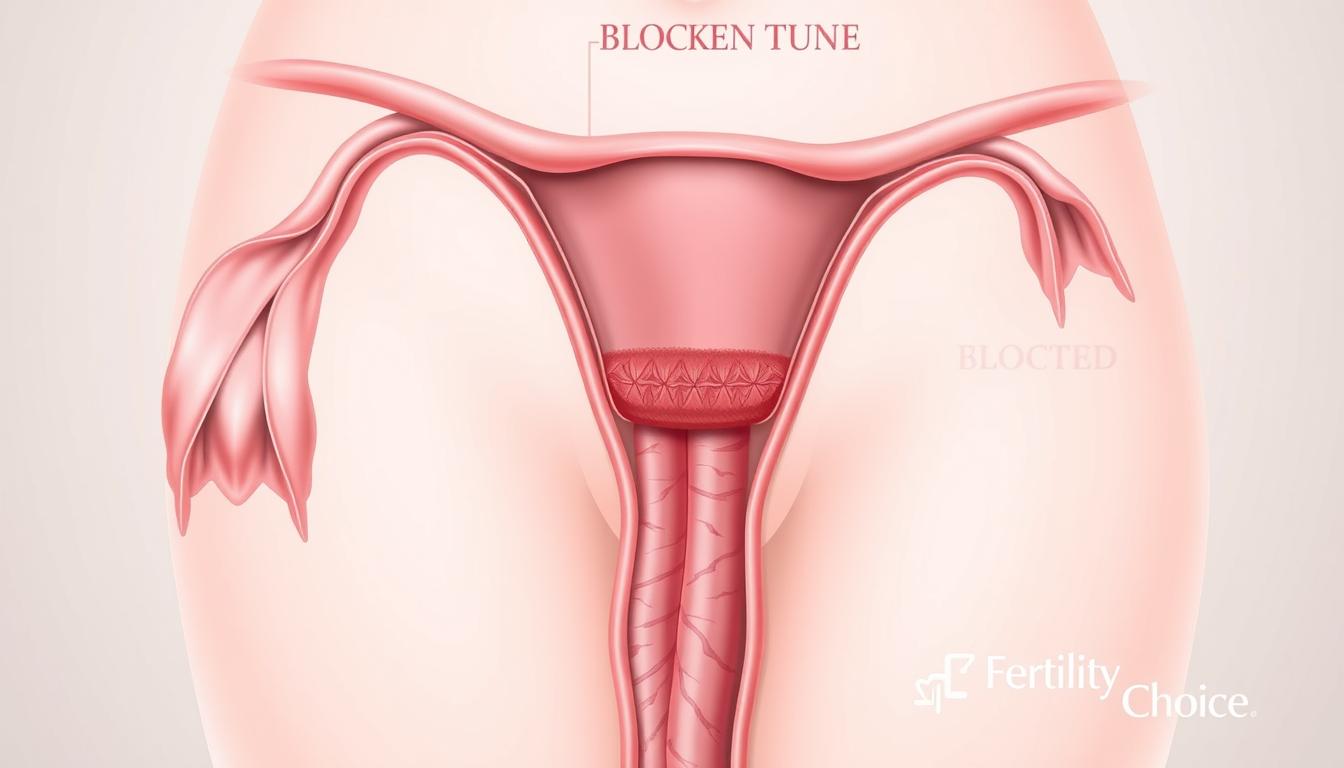
Blocked fallopian tubes are a major reason for infertility, affecting about 25-35% of women1. This issue stops the egg from moving from the ovary to the uterus, making it hard to get pregnant. Knowing what causes blocked fallopian tubes is key to solving the problem of fallopian tube blockage.
The fallopian tubes are muscular tubes that link the ovaries to the uterus. They are vital for fertility. So, when they are blocked, it can be a big problem for women trying to get pregnant.
Blocked fallopian tubes are behind 25-35% of female infertility cases2. To grasp this issue, it’s important to look at the common reasons for blocked fallopian tubes. These include pelvic inflammatory disease, endometriosis, and past surgeries. All these can lead to fallopian tube blockage and affect fertility.
Infertility is a common issue affecting many couples around the world. It’s important to know what infertility is and its types to find the right treatment. About 10%-15% of married couples face infertility3. In women, tubal blockage is a big reason, making up 30%-40% of fertility problems3.
Blocked fallopian tubes are often caused by untreated STIs and unsafe abortions4. There are two main types of infertility: primary and secondary. Primary is when you’ve never gotten pregnant, and secondary is when you’ve had a child but can’t now4. Knowing these types helps in finding the right treatment.
Infertility means you can’t get pregnant after a year of trying without protection. This definition helps us understand the different types and find the right treatment.
There are two main types: primary and secondary. Primary is when you’ve never gotten pregnant. Secondary is when you’ve had a child but can’t now.
In South Africa, about 30% of women face infertility due to fallopian tube problems3. Tubal blockage rises to 23% after pelvic inflammatory disease3. Knowing these stats helps tackle infertility in South Africa.
| Type of Infertility | Description |
|---|---|
| Primary Infertility | Inability to conceive after one year of unprotected sex |
| Secondary Infertility | Inability to conceive after previously having a child |
Male infertility is a big problem, and it’s key to know what causes it. Issues like low sperm count, poor sperm movement, and hormonal imbalances can stop a man from getting his partner pregnant5. These problems can come from many things, like blocked fallopian tubes, and other health issues6.
Male infertility can be due to many reasons. This includes sperm problems, hormonal issues, and physical issues5. Sperm issues might be because of immature or oddly shaped sperm, or not enough sperm6. Hormonal problems can mess with sperm production, and conditions like hypogonadotropic hypogonadism can cause hormonal imbalances7.
If you’re facing these issues, getting medical help is crucial. Early treatment can boost your chances of having a child5. Tests like semen analysis can find the problem, and treatments like IVF can help fix it6.
| Male Infertility Factors | Causes | Treatments |
|---|---|---|
| Low Sperm Count | Immature sperm, abnormally shaped sperm | Assisted reproductive technologies, such as IVF |
| Poor Sperm Motility | Hormonal disorders, structural problems | Medications, assisted reproductive technologies |
| Hormonal Imbalances | Conditions such as hypogonadotropic hypogonadism | Hormone replacement therapy, assisted reproductive technologies |
Female infertility is a big problem, and knowing the common causes is key. About 33% of the time, female factors lead to infertility8. Hormone problems, like those seen in polycystic ovary syndrome (PCOS), affect 5-10% of women8.
Fallopian tube damage is another major cause, with blocked fallopian tubes being responsible for 25-35% of cases9. This can happen due to pelvic inflammatory disease (PID), which affects 1 million women in the U.S. each year8. Uterine problems, like fibroids, also play a role, affecting 25% of women with infertility8.
There are many reasons for tubal blockages, including fallopian tube blockage from PID9. If you think you might have female infertility, seeing a doctor is crucial. They can help treat issues like blocked fallopian tubes with surgery or other methods, which can have success rates of 30%-60%9.
| Female Infertility Factor | Prevalence |
|---|---|
| Ovulation Disorders | Majority of female infertility cases8 |
| Fallopian Tube Damage | 25-35% of female infertility cases9 |
| Uterine Issues | Approximately 25% of women with infertility issues8 |

Knowing about ovulation disorders, fallopian tube damage, and uterine issues can help women get the right treatment. This can boost their chances of getting pregnant10. Keeping a healthy lifestyle, with a balanced diet and exercise, can also help improve fertility and overall health8.
As women get older, their ability to have children decreases. This is due to several reasons, including blocked tubes causes and fallopian tube blockage reasons11. Studies show that over 30 percent of women with infertility have damaged or blocked fallopian tubes11. This makes age a key factor in female fertility, with women over 35 facing a higher risk of infertility.
Women over 35 might need intrauterine insemination (IUI) or IVF after treatment11. Age also affects male fertility, with sperm quality and quantity decreasing as men get older. This decline in sperm quality is a critical factor to consider when trying to conceive.
Common causes of infertility in men include low sperm count, poor sperm motility, and hormonal imbalances. In women, tubal blockage causes can lead to infertility. Pelvic inflammatory disease (PID) is a major cause of blocked fallopian tubes, accounting for 10-15% of infertility cases12.
Age is a significant factor in fertility, affecting both women and men. It’s crucial to understand the risks and consequences of delayed parenthood. While treatments like IVF and surgery are available, success rates vary based on individual circumstances and age2.
Knowing how age impacts fertility can help individuals make informed decisions about their reproductive health. This knowledge can aid in planning for the future.
Lifestyle choices greatly affect fertility. Eating well, avoiding alcohol and tobacco, and keeping a healthy weight are key. A diet full of fruits, vegetables, and whole grains supports reproductive health13. But, a diet rich in processed foods and sugar can harm fertility.
Exercise and managing weight are also vital. Regular exercise boosts ovulation and reproductive health. Being overweight or underweight can upset hormonal balances and cause fertility problems14. Drinking too much alcohol can lower female fertility by 13% to 25% and increase miscarriage and premature birth risks13.
Blocked fallopian tubes are a big cause of female infertility, making up about 25% of cases13. Knowing what causes them, like pelvic inflammatory disease, helps prevent them. Healthy lifestyle choices can lower the risk of fallopian tube blockage and boost fertility3.
By following these tips and understanding how lifestyle affects fertility, you can improve your reproductive health. This increases your chances of getting pregnant14.
Environmental factors like chemical exposure and pollutants can harm fertility. They can cause tubal obstruction and blockage in fallopian tubes. Pesticides and metals can affect male fertility15. Air pollution can also lead to fertility problems in both men and women due to airborne toxins16.
Chemicals in plastics and pesticides can cause fertility issues. About 15-25% of couples face fertility problems because of these chemicals16. Heavy metals like lead, cadmium, and mercury can also lower fertility in men exposed at work16. Knowing about these factors helps in finding and fixing blocked tubes to boost fertility.
To lessen the effect of environmental factors on fertility, it’s key to cut down on pollutants and chemicals. A healthy lifestyle, including a balanced diet and exercise, is important. Being aware of pollution sources also helps. These steps can lower the risk of fallopian tube blockage and other fertility issues16.
Many medical conditions can affect fertility. It’s key to know about these to tackle infertility. Tubal blockage causes include pelvic inflammatory disease (PID) and endometriosis17. PID is behind 25% to 50% of Fallopian tube blockages. Endometriosis, affecting 10% of women, can also block tubes17.
PCOS and thyroid issues also play a role. PCOS affects 6-12% of women, making it a common infertility cause8. Thyroid problems can mess with ovulation and menstruation, leading to infertility. Finding the root of infertility, like reasons for blocked fallopian tubes and what causes blocked fallopian tubes, is crucial for treatment.
Key factors include:
These conditions can be treated, and fertility can be restored. IVF is a good option for 40% of women with blocked tubes, offering a chance to conceive when natural methods don’t work17.
If you’re struggling with infertility symptoms, see a doctor. They can find the cause and create a treatment plan. Knowing about these medical conditions is the first step to overcoming fertility issues and reaching reproductive goals.
Genetic factors can greatly impact fertility. It’s crucial to grasp how they affect it. Inherited conditions, like blocked fallopian tubes or fallopian tube blockage, can lead to infertility. The causes of tubal obstruction vary, including pelvic inflammatory disease (PID)18.
Research shows that tubal factor infertility makes up about 25-30% of all infertility cases18. A hysterosalpingogram (HSG) test might show false positives of blocked tubes in about 15% of women18. Women with severely damaged fallopian tubes face slim chances of natural pregnancy. This often leads to IVF being the top choice18.
Important points about genetic factors in infertility include:
Understanding genetic factors in infertility is key. If you’re having trouble conceiving, seek medical help. Genetic testing can identify these factors. It helps individuals make informed decisions about their fertility18.
Infertility can really affect a person’s mental health, leading to stress and anxiety for many. It’s a big emotional burden. Research shows that about 50% of women and 15% of men find infertility very upsetting20.
Couples dealing with infertility face special challenges. The emotional strain of blocked tubes causes, fallopian tube blockage reasons, and tubal blockage causes can make things worse. It’s important to tackle these mental health issues to help overall well-being and fertility chances21.
Some key statistics show the emotional toll of infertility:

By understanding and dealing with the emotional side of infertility, people can handle its challenges better. This improves their overall well-being21.
| Emotional Impact | Percentage of Women | Percentage of Men |
|---|---|---|
| Clinical anxiety symptoms | 76% | 61% |
| Clinical-level depression symptoms | 50% | 33% |
If you and your partner have been trying to conceive for a year or more without success, it’s time to seek professional help for infertility23. Look out for signs like irregular or absent menstrual cycles, pelvic pain, and a history of sexually transmitted infections. These can cause fallopian tube blockages24.
Begin by talking to your primary care physician or gynecologist. They can do basic fertility tests. This might include a blood test for hormone levels or a HSG to check your fallopian tubes24. If a blockage is found, your doctor might suggest treatments like tubal cannulation to help restore fertility23.
If you face more complex issues, you might see a fertility specialist. They can do more tests and suggest the best treatment. This could be in vitro fertilization (IVF) or other assisted reproductive technologies2325. Remember, acting early is crucial. Fertility can drop with age, more so for women2325.
Stay Connected and Get Personalized Assistance
Thank you for reading! We hope you found this post helpful and informative. If you have any questions or need further assistance, please reach out. We’re here to help you on your journey
